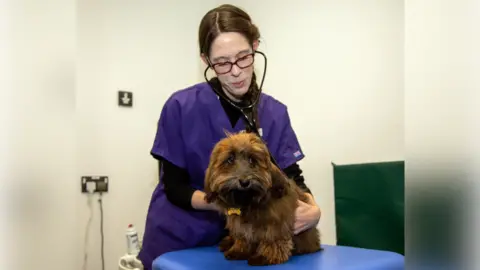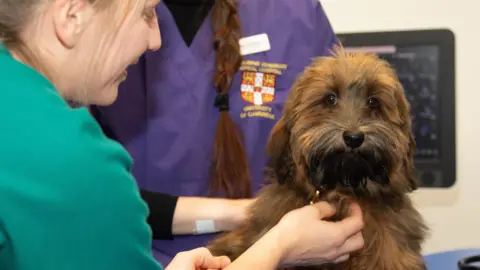AI being used to detect heart murmurs in dogs
Alice Cunningham
BBC News, Cambridgeshire

University of Cambridge
Researchers at the University of Cambridge have developed an AI algorithm that can detect heart murmurs in dogs
Researchers have said they are using Artificial Intelligence (AI) to accurately detect heart murmurs in dogs.
A team at the University of Cambridge has developed an algorithm - a set of coded instructions - that was originally designed for humans, but can also detect and grade murmurs in dogs.
Heart murmurs are one of the main indicators of heart disease, which can affect a large number of smaller breeds like King Charles Spaniels.
Dr Andrew McDonald, the first author of the research, said: "Heart disease in humans is a huge health issue, but in dogs it’s an even bigger problem."
He added: "As far as we’re aware, there are no existing databases of heart sounds in dogs, which is why we started out with a database of heart sounds in humans.
"Mammalian hearts are fairly similar, and when things go wrong, they tend to go wrong in similar ways."

Researchers at the University of Cambridge have developed an AI algorithm that can detect heart murmurs in dogs
Researchers have said they are using Artificial Intelligence (AI) to accurately detect heart murmurs in dogs.
A team at the University of Cambridge has developed an algorithm - a set of coded instructions - that was originally designed for humans, but can also detect and grade murmurs in dogs.
Heart murmurs are one of the main indicators of heart disease, which can affect a large number of smaller breeds like King Charles Spaniels.
Dr Andrew McDonald, the first author of the research, said: "Heart disease in humans is a huge health issue, but in dogs it’s an even bigger problem."
He added: "As far as we’re aware, there are no existing databases of heart sounds in dogs, which is why we started out with a database of heart sounds in humans.
"Mammalian hearts are fairly similar, and when things go wrong, they tend to go wrong in similar ways."

University of Cambridge
Heart murmurs are a key indicator of heart disease in dogs
Researchers started with a database of heart sounds from about 1,000 human patients and developed a machine-learning algorithm to replicate whether a heart murmur had been detected by a cardiologist.
This algorithm was then adapted, so it could be used with heart sounds from dogs.
Almost 800 dogs undergoing routine heart examinations at four specialist vet centres across the UK were used for the research.
They received a full physical examination, as well as a heart scan by a cardiologist to grade any heart murmurs and identify cardiac disease.
Their heart rhythms were recorded using an electronic stethoscope.
It is believed this was the largest dataset of dog heart sounds ever created.
Co-author Prof Jose Novo Matos said the team wanted to get data "from dogs of all shapes, sizes and ages".
He added: "The more data we have to train it, the more useful our algorithm will be, both for vets and for dog owners."
Analysis of the algorithm found it agreed with the cardiologist's assessment in over half of cases.
In 90% of cases, it was within in a single grade of the cardiologist's assessment which researchers said was a promising result.
Heart murmurs are a key indicator of heart disease in dogs
Researchers started with a database of heart sounds from about 1,000 human patients and developed a machine-learning algorithm to replicate whether a heart murmur had been detected by a cardiologist.
This algorithm was then adapted, so it could be used with heart sounds from dogs.
Almost 800 dogs undergoing routine heart examinations at four specialist vet centres across the UK were used for the research.
They received a full physical examination, as well as a heart scan by a cardiologist to grade any heart murmurs and identify cardiac disease.
Their heart rhythms were recorded using an electronic stethoscope.
It is believed this was the largest dataset of dog heart sounds ever created.
Co-author Prof Jose Novo Matos said the team wanted to get data "from dogs of all shapes, sizes and ages".
He added: "The more data we have to train it, the more useful our algorithm will be, both for vets and for dog owners."
Analysis of the algorithm found it agreed with the cardiologist's assessment in over half of cases.
In 90% of cases, it was within in a single grade of the cardiologist's assessment which researchers said was a promising result.
No comments:
Post a Comment